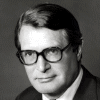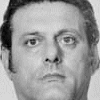|
Howard Baker
was vice-chairman of the Senate Watergate
Committee. |
|
Bernard Barker was
one of the five men arrested for breaking into
the Watergate offices of the Democratic National
Committee. He pled guilty on January 15, 1973. |
|
Carl Bernstein
was a college dropout covering the local scene
for the Washington Post when the
Watergate saga began. Teamed with fellow Post
reporter Bob Woodward, he kept the nation
informed of every twist and turn of the
investigation, and helped uncover conspiracies
official investigators had little or no knowledge
of. |
|
Robert
Bork was Solicitor General of the
United States when he was thrust into the
Watergate Affair. It was he who fired Special
Prosecutor Cox, after both Attorney General
Elliot Richardson and Deputy Attorney General
William Ruckelshaus resigned. |
|
J. Fred Buzhardt
was Nixon's counsel during the final year of
Watergate. It was he who devised the
"Stennis compromise" over access to
Nixon's White House tapes. Despite suffering a
heart attack, he continued with Nixon until the
last, and died in 1978. |
|
Charles
W. Colson was indicted in both the
Ellsberg and Watergate cases. On June 3, 1973, he
pled guilty to charges related to the Ellsberg
case. Although he was the highest Nixon adviser
to accept a guilty plea in either case, he never
turned against the President. |
|
Archibald Cox
was selected by Elliot L. Richardson to be the
Watergate special prosecutor. His insistence in
demanding Nixon's White House tapes infuriated
the President, who demanded that Richardson fire
him. |
|
White House counsel John
W. Dean was fired the same day that John
Ehrlichman and H.R. Haldeman resigned. His
week-long appearance before the Senate Watergate
Committee led directly to the disclosure of
Nixon's private taping system. |
|
John Doar was
chief counsel of the House impeachment inquiry. |
|
Senior White House aide John
D. Ehrlichman resigned at the height of
the scandal in a vain attempt to save Nixon. |
|
Sam Ervin was
chairman of the Senate Watergate Committee. |
|
Mark Felt was
a top official at the FBI in 1972. It was he who,
under the code name "Deep Throat,"
provided inside information to Washington
Post reporter Bob Woodward regarding the
FBI's involvement with the Watergate cover-up.
His identity was kept secret until 2005, when
Felt himself confessed to family members that he
was indeed the man known as "Deep
Throat;" he was on his deathbed at the time. |
|
Virgilio R. Gonzalez
was one of the five men arrested for breaking
into the Watergate offices of the Democratic
National Committee. He pled guilty on January 15,
1973. |
 |
L. Patrick Gray,
an ardent Nixon loyalist, was Nixon's choice to
head the Federal Bureau of Investigation. He
unwittingly blew the lid off the Watergate
cover-up during his nomination hearings, and had
to resign when it was revealed that he had burned
evidence entrusted to him. |
|
Alexander
Haig resigned from the Army in order
to replace H.R. Haldeman as White House Chief of
Staff. |
|
White House Chief of Staff H.
R. (Bob) Haldeman resigned at the height
of the scandal in a vain attempt to save Nixon. |
|
E. Howard Hunt,
a veteran CIA clandestine service officer, was
part of the Ellsberg break-in operation and
recruited the Miami team for Watergate. He pled
guilty on January 11, 1973. |
|
Leon
Jaworski, the second special
prosecutor, authorized the grand jury to list the
President as an "unindicted
co-conspirator" and to submit the evidence
they had to the House impeachment investigation.
He retired from the position on October 25, 1974,
after the jury in the Watergate conspiracy trial
was sequestered. |
|
Herbert W. Kalmbach,
Nixon's personal lawyer and chief campaign
fund-raiser, achieved a record of extracting
large contributions from corporate contacts. He
was put in charge of the initial hush money
operation aimed at keeping the Watergate
defendants quiet. He pled guilty to two
violations of campaign financing laws, including
the sale of an ambassadorial post. |
|
Richard G. Kleindienst
replaced John Mitchell as Attorney General. His
resignation less than a year later was followed
by a criminal conviction for failing to testify
fully at a congressional hearing. |
|
Egil (Bud) Krogh, Jr.,
was one of Haldeman's aides when he was propelled
into the heart of the Watergate conspiracy as the
head of the "White House Plumbers." He
pled guilty to a felony charge in connection with
the break-in at the office of Daniel Ellsberg's
psychiatrist. |
|
Fred LaRue,
John Mitchell's closest lieutenant, took over
distribution of hush money from Kalmbach. |
|
G. Gordon Liddy
teamed with E. Howard Hunt in the Ellsberg
operations. He planned and led the Watergate
break-in while employed as full-time counsel of
the Nixon re-election committee. He was convicted
on all counts resulting from the break-in, on
January 30, 1973. |
|
Jeb S. Magruder
was the young Haldeman staffer put in charge of
the re-election campaign until John Mitchell took
over. |
|
E. Rolando Martinez
was one of the five men arrested for breaking
into the Watergate offices of the Democratic
National Committee. He pled guilty on January 15,
1973. |
|
James W. McCord
was one of the five men arrested for breaking
into the Watergate offices of the Democratic
National Committee. An ex-CIA man, he ripped the
cover-up wide open when a wrote a letter to the
trial judge charging that higher-ups were
involved in the break-in. He was convicted on all
counts resulting from the break-in, on January
30, 1973. |
|
John Mitchell
was Nixon's closest political adviser, first
Attorney General, and head of his re-election
campaign. At one time during the investigation,
he offered to plead guilty if the Watergate
prosecutors ceased their pursuit of Nixon; his
offer was rejected. |
|
Henry Petersen,
as assistant attorney general in charge of
prosecutions, decided to restrict the scope of
indictments in the first Watergate case to those
directly concerned with the break-in. He was
taken off the case and replaced by an independent
special prosecutor. |
 |
Elliot L. Richardson
was appointed by Nixon to replace Kleindienst as
Attorney General. He was forced to resign after
selecting Archibald Cox to be the Watergate
special prosecutor and then refusing to fire him. |
|
Peter Rodino
was chairman of the House Judiciary Committe
which, in July 1974, voted to recommend three articles of impeachment
against Nixon at a trial by the Senate. |
|
William Ruckelshaus
was Deputy Attorney General under Elliot
Richardson. He, like Richardson, resigned rather
than carry out Nixon's order to fire Special
Prosecutor Cox. |
|
James St. Clair
left a very successful private practice to take
charge of President Nixon's Watergate defense.
Despite his best efforts to keep Watergate
evidence out of the hands of investigators, he
lost the landmark Supreme Court case when the
Justices ruled that Nixon had to surrender
tape-recorded conversations. |
|
Federal Chief Judge John
Sirica was famous for being reversed on
appeal, but his rulings that the President must
submit his tapes to the court were upheld by the
D.C. Federal Court of Appeals and by the U.S.
Supreme Court. He also helped bust the cover-up
by imposing maximum sentences on all seven of the
men originally charged in connection with the
Watergate break-in. |
 |
Frank A. Sturgis
was one of the five men arrested for breaking
into the Watergate offices of the Democratic
National Committee. He pled guilty on January 15,
1973. |
|
Anthony T. (Tony)
Ulasewicz was an ex-NYPD cop who was
hired to act as Nixon's "private eye."
He performed an array of interesting roles, from
posing as a newman after Chappaquiddick to casing
burglary targets like the Brookings Institution. |
|
Rose Mary Woods,
Nixon's long-time secretary, was one of the most
loyal and toughest members of the Nixon
"family." She testified that she had
inadvertently caused the infamous 18½-minute gap
in a key White House tape when she reached to
answer the telephone while transcribing the tape.
Although her story was doubted by the
investigating committee, she was never
prosecuted. |
|
Bob Woodward
was covering arraignment court proceedings when
the Watergate burglars appeared to enter their
pleas and was surprised to hear one of them claim
to work for the White House. Teaming with fellow Post
reporter Carl Bernstein, he kept the nation
informed of every twist and turn of the
investigation, and helped uncover conspiracies
official investigators had little or no knowledge
of. |
